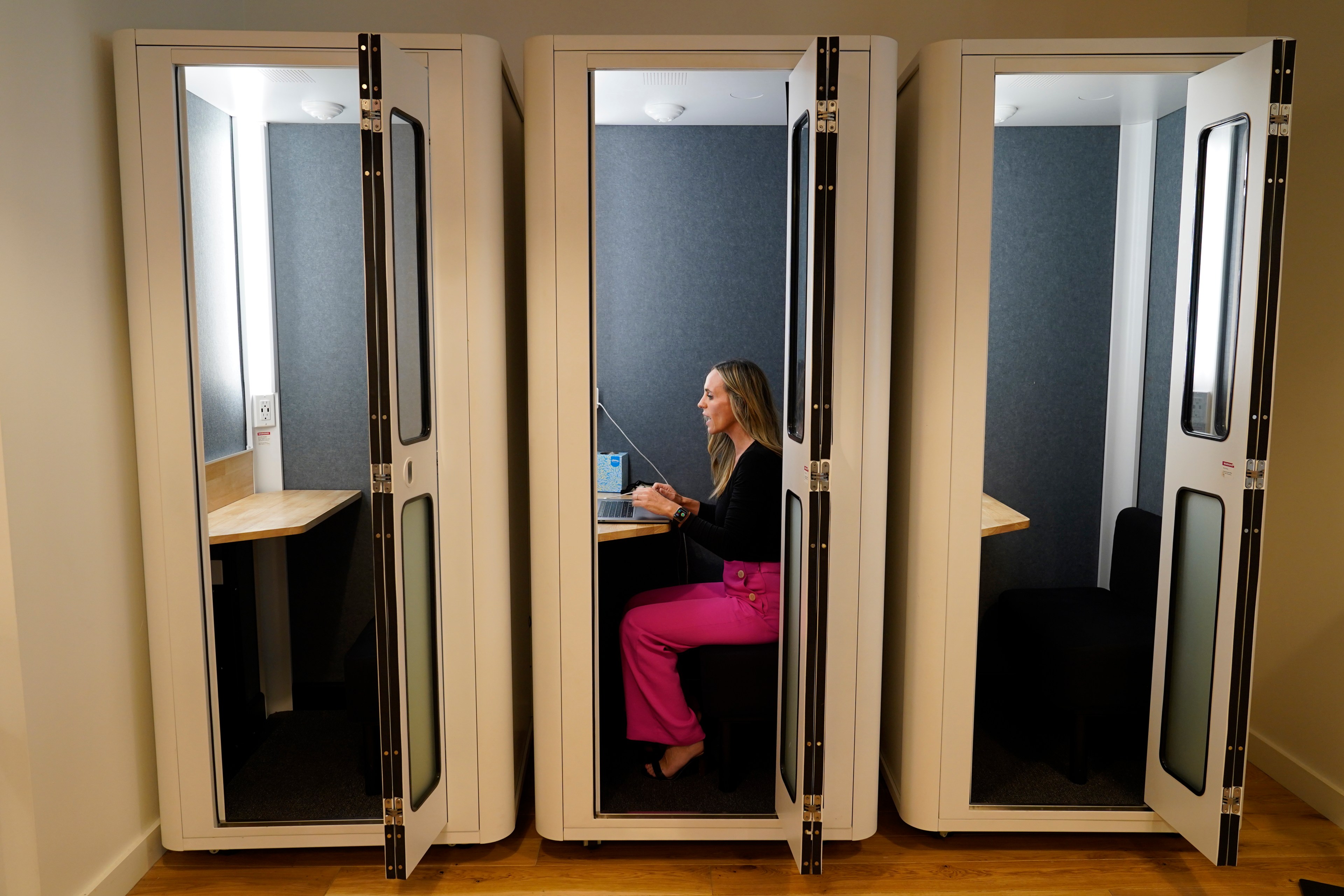That airtight phone booth where you escape to take sensitive calls at work? It could be illegal.
Prefab privacy booths—those soundproof, refrigerator-sized pods that have become near-ubiquitous in San Francisco offices—aren’t as plug-and-play as many building owners and company managers may have assumed. The Standard has learned that, according to San Francisco building code, these booths actually need a safety permit issued by the city.
According to the Department of Building Inspection, these mini-workspaces for workers are supposed to include—among other features—a sprinkler to adhere to the city’s fire code. That means most, if not all, of the thousands of phone booths in offices around the city are likely violating code.
Complaints about these rules took off on social media when Elon Musk pal and effective accelerationist leader @BasedBeffJezos, also known as AI startup founder Guillaume Verdon, posted about seeing several phone booths ripped out of a Downtown San Francisco WeWork.
Apparently you need permits (!!!) for phone booths (?!?!) in SF… they were just ripped out of the local WeWork.
— Beff – e/acc (@BasedBeffJezos) January 30, 2024
Unreal Decel BS.
Patrick Hannan, the spokesperson for the Department of Building Inspection, confirmed that an over-the-counter permit is required to legally install phone booths inside San Francisco offices.
Hannan said the permit is routed through building and fire plan review and, typically, is processed within two days. He noted that San Francisco’s building code is based on the state’s guidelines.
“The fire code requires that buildings with fire sprinklers, alarms and strobe lights also equip newly enclosed interior spaces with fire sprinklers, alarms and strobe lights,” Hannan told The Standard in an email. “A permit is how the city verifies that these safety features are provided in a new prefab phone booth.”
A key reason for these permits, according to Hannan, is the need for these phone booths to have building-grade safety features in the event of a fire. Some exemptions exist for smaller booths proven to be constructed of noncombustible materials that are at least 4 feet away from similar structures.
Besides the fire safety measures, the permit is also meant to ensure that the structure is anchored and therefore seismically safe, meaning “it doesn’t tip over in an earthquake,” Hannan said. There are also accessibility requirements meant to allow disabled people to enter the booths.
Phone booth manufacturers are well aware of San Francisco’s requirements. Most pods manufactured by Room, a popular purveyor of these booths that counts the San Francisco offices of Block, Headspace and Google among its clientele, already come with pre-drilled holes for sprinklers and fire alarms, a company spokesperson told The Standard.
It also provides directions for installing alarms and strobes to comply with the fire code. But since they don’t come built-in, the onus remains on building operators and companies to install the alarm and sprinkler systems after setting up these $6,000 pods.
San Francisco architect John Lum, whose firm works on residential and commercial interiors in addition to new residential builds, told The Standard he was initially puzzled by the permit requirements for what he considers a piece of furniture. But as he discussed it with his colleagues—who were also apparently none the wiser—the seemingly arbitrary policy made a bit more sense.
“The first reaction is what Beff Jezos said,” Lum said with a laugh, “which is like, ‘What the fuck?’ But on the other hand, … you don’t want to create codes after the fact.” Building and fire codes, he emphasized, are based on safety and “are not an arbitrary thing about aesthetics or regulation.”
He likened the rule to increased regulation on parklets around the city, as both are “totally unregulated spaces” that may have received more scrutiny in the aftermath of the pandemic.
Of course, that leaves one key question unanswered: What happens to the legions of scofflaw phone booths already installed all over San Francisco?
Hannan said it hasn’t been too much of a problem to date. The city has only received three complaints about unpermitted phone booths and hasn’t issued any notices of violation, which would be associated with financial penalties.
Only in San Francisco, right? Not quite.
According to a Room spokesperson, the city of Bellevue, Washington—home to tech offices for Microsoft, Salesforce and Samsung, among others—also requires sprinklers in its phone booths.
